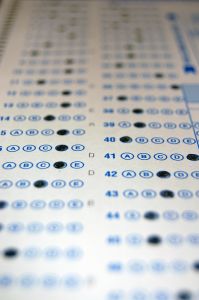Monica Mula ’10
Web Opinions Editor

Each year around mid–March, the stress levels among the grades are drastically different.
Sophomores have just finished the long weeks of CAPT testing, while all other grades have enjoyed weeks of sleeping in and feel well-rested and refreshed.
Now comes the time for juniors to pay their testing dues as well, as the PSATs and SATs quickly approach.
What many may not realize, however, is that three fourths of the sophomore class will actually be continuing their testing after CAPT, spending 3 hours back at school on a Saturday for the PSAT simulation.
Often referred to as the PPSAT, this test is a practice for the practice SAT.
“The testing was established to fulfill the needs of parents and students,” said Amedeo Canone, in charge of the Westport Continuing Education program that offers the test to sophomores.
Students are eager and interested in trying the test as early as possible, making it one of the most popular options that Continuing Ed has to offer.
For a $35 fee, sophomores can get accustomed to all standard test–taking procedures.
Math teacher Alan Jolley is the organizer and administrator of the test. He works hard to make sure materials are arranged properly, teachers are equipped to proctor, and afterwards, that the tests are scored carefully and by hand.
“I have to ensure that the test is an exact simulation of the PSAT they will be taking the following year,” said Jolley. “Everything is administered according to official regulation.”
The community reacted positively to this testing option—the number of sophomores who took it increased steadily over the four years it has been in effect.
In 2006, 145 students took the PPSAT, 2007 saw 219 sophomores, 237 signed up in 2008, and in 2009 the total raised to 294, just approaching the limit of the 300 spots that are available.
This increase in popularity can be accredited to word of mouth and advertisements in the Continuing Ed handbook, but also to the Guidance Department.
“Though we don’t force or require sophomores to take it, it can definitely be a good way for students to become familiar with both the material and the process of the test,” said Elaine Schwartz, director of guidance.
Schwartz went on to say that it is important for sophomores to be of a certain mindset so as not to worry or stress about results.
Jolley has a similar belief, saying that because 10th grade students are still learning many concepts in their current math classes, they should not expect to score as high as they may the next year.
“Students have to be realistic when they see their scores. They have no reason to be discouraged by a score they weren’t expecting,” Jolley said.
Sophomores should also feel comforted by the fact that their scores are completely private, and are sent to the student only.
Junior Harry Lawrence took the test his sophomore year, knowing that Merit Scholarships would be awarded for PSAT scores. The test for him, and others alike, acts as a chance to improve scores before junior year opportunities.
“I wanted to be better prepared for the PSAT, and later, the SAT,” said Lawrence ’11.
Though Lawrence took advantage of the practice, he prepared for it completely on his own.
Since this test is optional, freshman honors and sophomore classes spend the majority of time prepping for CAPT and almost none on the PPSAT.
“The vocabulary that we review could definitely be beneficial, however there is no official review,” said English teacher MaryElizabeth Fulco.
Because it’s optional and results are private, it is collectively agreed by teachers and administrators that the test should not elicit extra stress for sophomores.
“We simply want to increase their confidence in test-taking, and only if they so choose,” Schwartz said.












































